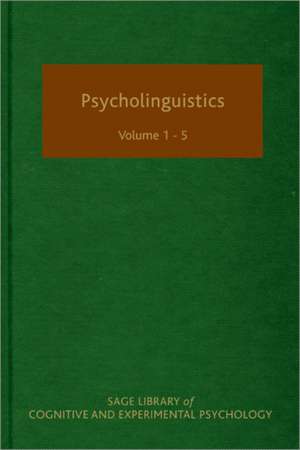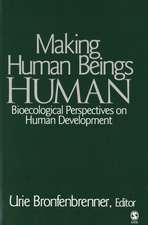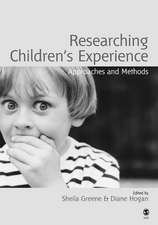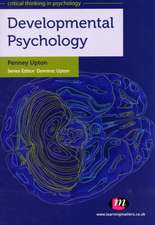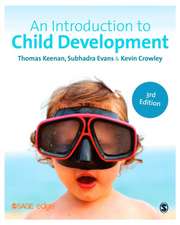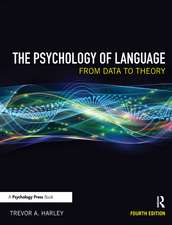Psycholinguistics: SAGE Library of Cognitive and Experimental Psychology
Editat de Trevor A. Harleyen Limba Engleză Hardback – 11 noi 2010
Part One: Production
Part Two: Recognition and Comprehension
Part Three: Learning to Read
Part Four: Representation
Part Five: Development
Containing the most seminal, cutting-edge and field-defining papers in the field, this major work should prove an invaluable addition to any library with a collection in psychological science, and whose faculty and students wish to learn more about this historically significant discipline.
Preț: 7452.33 lei
Preț vechi: 8665.50 lei
-14% Nou
Puncte Express: 11178
Preț estimativ în valută:
1426.17€ • 1548.61$ • 1197.98£
1426.17€ • 1548.61$ • 1197.98£
Carte tipărită la comandă
Livrare economică 23 aprilie-07 mai
Preluare comenzi: 021 569.72.76
Specificații
ISBN-13: 9781847875983
ISBN-10: 184787598X
Pagini: 2528
Dimensiuni: 156 x 234 x 91 mm
Greutate: 4.97 kg
Ediția:Six-Volume Set
Editura: SAGE Publications
Colecția Sage Publications Ltd
Seria SAGE Library of Cognitive and Experimental Psychology
Locul publicării:London, United Kingdom
ISBN-10: 184787598X
Pagini: 2528
Dimensiuni: 156 x 234 x 91 mm
Greutate: 4.97 kg
Ediția:Six-Volume Set
Editura: SAGE Publications
Colecția Sage Publications Ltd
Seria SAGE Library of Cognitive and Experimental Psychology
Locul publicării:London, United Kingdom
Cuprins
VOLUME 1
Part One: Production
Aging and Language Production - Deborah Burke and Meredith Shafto
How Many Levels of Processing Are There in Lexical Access? - Alfonso Caramazza
Lexical Access in Aphasic and Nonaphasic Speakers - Gary Dell et al
Making Sense of Syntax: Number agreement in sentence production - Kathleen Eberhard, J. Cooper Cutting and Kathryn Bock
The Spatial and Temporal Signatures of Word Production Components - Peter Indefrey and Willem Levelt
Phonological Priming Effects on Word Retrieval and Tip-Of-The-Tongue Experiences in Younger and Older Adults - Lori James and Deborah Burke
A Theory of Lexical Access in Speech Production - Willem Levelt, Ardi Roelofs and Antje Meyer
VOLUME 2
Structural Priming: A critical review - Martin Pickering and Victor Ferreira
Grammatical Gender Is on the Tip of Italian Tongues - Gabriella Vigliocco, Tiziana Antonini and Merrill Garrett
The Interplay of Meaning, Sound, and Syntax in Sentence Production - Gabriella Vigliocco and Robert Hartsuiker
Part Two: Recognition and Comprehension
The Influence of Age of Acquisition in Word Reading and Other Tasks: A never ending story? - Patrick Bonin et al
Thematic Roles Assigned along the Garden Path Linger - Kiel Christianson et al
DRC: A dual route cascaded model of visual word recognition and reading aloud - Max Coltheart et al
Good-enough Representations in Language Comprehension - Fernanda Ferreira, Karl Bailey and Vittoria Ferraro
Processing Local Transitions versus Long-distance Syntactic Hierarchies - Angela Friederici
Representation and Competition in the Perception of Spoken Words - M. Gareth Gaskell and William Marslen-Wilson
VOLUME 3
Computing the Meanings of Words in Reading: Cooperative division of labor between visual words and phonological processes - Michael Harm and Mark Seidenberg
Integration of Multiple Speech Segmentation Cues: A hierarchical framework - Sven Mattys, Laurence White and James Melhorn
Attractor Dynamics in Word Recognition: Converging evidence from errors by normal subjects, dyslexic patients and a connectionist model - Peter McLeod, Tim Shallice and David Plaut
Serial Mechanisms in Lexical Access: The rank hypothesis - Wayne Murray and Ken Forster
Shortlist B: A Bayesian model of continuous speech recognition - Dennis Norris and James McQueen
Toward a Mechanistic Psychology of Dialogue - Martin Pickering and Simon Garrod
VOLUME 4
Understanding Normal and Impaired Word Reading: Computational principles in quasi-regular domains - David Plaut et al
The E-Z Reader Model of Eye Movement Control in Reading: Comparisons to other models - Erik Reichle, Keith Rayner and Alexander Pollatsek
Does Lexical Information Influence the Perceptual Restoration of Phonemes? - Arthur Samuel
Eye Movements and Spoken Language Comprehension: Effects of visual context on syntactic ambiguity resolution - Michael Spivey et al
Part Three: Learning to Read
Reading Acquisition, Phonology, and Dyslexia: Insights from a connectionist model - Michael Harm and Mark Seidenberg
Developmental Dyslexia: The cerebellar deficit hypothesis - Roderick Nicolson, Angela Fawcett and Paul Dean
Reading Acquisition, Developmental Dyslexia, and Skilled Reading Across Languages: A psycholinguistic grain size theory - Johannes Ziegler and Usha Goswami
VOLUME 5
Part Four: Representation
Domain-specific Knowledge Systems in the Brain: The animate-inanimate distinction - Alfons Caramazza and Jennifer Shelton
Distinctive Features Hold a Privileged Status in the Computation of Word Meaning: Implications for theories of semantic memory - George Cree, Chris McNorgan and Ken McRae
The Bilingual Brain: Cerebral representation of languages - Franco Fabbro
Symbol Grounding and Meaning: A comparison of high-dimensional and embodied theories of meaning - Arthur Glenberg and David Robertson
The Neurology of Syntax: Language use without Broca's area - Yosef Grodzinsky
On Broca, Brains, and Binding: A new framework - Peter Hagoort
A Solution to Plato's Problem: The latent semantic analysis theory of acquisition, induction, and representation of knowledge - Thomas Landauer and Susan Dumais
Reassessing Working Memory: Comment on Just and Carpenter (1992) and Waters and Caplan (1996) - Maryellen MacDonald and Morten Christiansen
Rules or Connections in Past-tense Inflections: What does the evidence rule out? - James McClelland and Karalyn Patterson
Toward a Mechanistic Psychology of Dialogue - Martin Pickering and Simon Garrod
The Myth of the Visual Word Form Area - Cathy Price and Joseph Devlin
Structure and Deterioration of Semantic Memory: A neuropsychological and computational investigation - Timothy Rogers et al
Grounding Words in Perception and Action: Computational insights - Deb Roy
Networks Are Not 'Hidden Rules' - Mark Seidenberg and Jeffrey Elman
Updating Situation Models - Rolf Zwaan and Carol Madden
VOLUME 6
Part Five: Development
Précis of How Children Learn the Meaning of Words - Paul Bloom
Probabilistic Models of Language Processing and Acquisition - Nick Chater and Christopher Manning
Human Simulations of Lexical Acquisition - Jane Gillette et al
Language Deficits and Genetic Factors - Myrna Gopnik
Specific Language Impairment: A deficit in grammar or processing? - Marc Joanisse and Mark Seidenberg
Frequent Frames As a Cue for Grammatical Categories in Child Directed Speech - Toben Mintz
The Past and Future of the Past Tense And Reply - Steven Pinker and Michael Ullman
Language Acquisition in the Absence of Explicit Negative Evidence: How important is starting small? - Douglas Rohde and David Plaut
Statistical Learning by 8-month-old Infants - Jenny Saffran, Richard Aslin and Elissa Newport
Do Young Children Have Adult Syntactic Competence? - Michael Tomasello
Other Topics: Animals, Evolution, and Language and Thought
Does Language Shape Thought? Mandarin and English speakers' conceptions of time - Lera Boroditsky
Numerical Thought With and Without Words: Evidence from indigenous Australian children - Brian Butterworth et al
On the Origins of Modernity: Was autonomous speech the critical factor? - Michael Corballis
Computational Constraints on Syntactic Processing in a Nonhuman Primate - W. Tecumseh Fitch and Marc Hauser
The Faculty of Language: What is it, who has it, and how did it evolve? - Marc Hauser, Noam Chomsky and W. Tecumseh Fitch
Part One: Production
Aging and Language Production - Deborah Burke and Meredith Shafto
How Many Levels of Processing Are There in Lexical Access? - Alfonso Caramazza
Lexical Access in Aphasic and Nonaphasic Speakers - Gary Dell et al
Making Sense of Syntax: Number agreement in sentence production - Kathleen Eberhard, J. Cooper Cutting and Kathryn Bock
The Spatial and Temporal Signatures of Word Production Components - Peter Indefrey and Willem Levelt
Phonological Priming Effects on Word Retrieval and Tip-Of-The-Tongue Experiences in Younger and Older Adults - Lori James and Deborah Burke
A Theory of Lexical Access in Speech Production - Willem Levelt, Ardi Roelofs and Antje Meyer
VOLUME 2
Structural Priming: A critical review - Martin Pickering and Victor Ferreira
Grammatical Gender Is on the Tip of Italian Tongues - Gabriella Vigliocco, Tiziana Antonini and Merrill Garrett
The Interplay of Meaning, Sound, and Syntax in Sentence Production - Gabriella Vigliocco and Robert Hartsuiker
Part Two: Recognition and Comprehension
The Influence of Age of Acquisition in Word Reading and Other Tasks: A never ending story? - Patrick Bonin et al
Thematic Roles Assigned along the Garden Path Linger - Kiel Christianson et al
DRC: A dual route cascaded model of visual word recognition and reading aloud - Max Coltheart et al
Good-enough Representations in Language Comprehension - Fernanda Ferreira, Karl Bailey and Vittoria Ferraro
Processing Local Transitions versus Long-distance Syntactic Hierarchies - Angela Friederici
Representation and Competition in the Perception of Spoken Words - M. Gareth Gaskell and William Marslen-Wilson
VOLUME 3
Computing the Meanings of Words in Reading: Cooperative division of labor between visual words and phonological processes - Michael Harm and Mark Seidenberg
Integration of Multiple Speech Segmentation Cues: A hierarchical framework - Sven Mattys, Laurence White and James Melhorn
Attractor Dynamics in Word Recognition: Converging evidence from errors by normal subjects, dyslexic patients and a connectionist model - Peter McLeod, Tim Shallice and David Plaut
Serial Mechanisms in Lexical Access: The rank hypothesis - Wayne Murray and Ken Forster
Shortlist B: A Bayesian model of continuous speech recognition - Dennis Norris and James McQueen
Toward a Mechanistic Psychology of Dialogue - Martin Pickering and Simon Garrod
VOLUME 4
Understanding Normal and Impaired Word Reading: Computational principles in quasi-regular domains - David Plaut et al
The E-Z Reader Model of Eye Movement Control in Reading: Comparisons to other models - Erik Reichle, Keith Rayner and Alexander Pollatsek
Does Lexical Information Influence the Perceptual Restoration of Phonemes? - Arthur Samuel
Eye Movements and Spoken Language Comprehension: Effects of visual context on syntactic ambiguity resolution - Michael Spivey et al
Part Three: Learning to Read
Reading Acquisition, Phonology, and Dyslexia: Insights from a connectionist model - Michael Harm and Mark Seidenberg
Developmental Dyslexia: The cerebellar deficit hypothesis - Roderick Nicolson, Angela Fawcett and Paul Dean
Reading Acquisition, Developmental Dyslexia, and Skilled Reading Across Languages: A psycholinguistic grain size theory - Johannes Ziegler and Usha Goswami
VOLUME 5
Part Four: Representation
Domain-specific Knowledge Systems in the Brain: The animate-inanimate distinction - Alfons Caramazza and Jennifer Shelton
Distinctive Features Hold a Privileged Status in the Computation of Word Meaning: Implications for theories of semantic memory - George Cree, Chris McNorgan and Ken McRae
The Bilingual Brain: Cerebral representation of languages - Franco Fabbro
Symbol Grounding and Meaning: A comparison of high-dimensional and embodied theories of meaning - Arthur Glenberg and David Robertson
The Neurology of Syntax: Language use without Broca's area - Yosef Grodzinsky
On Broca, Brains, and Binding: A new framework - Peter Hagoort
A Solution to Plato's Problem: The latent semantic analysis theory of acquisition, induction, and representation of knowledge - Thomas Landauer and Susan Dumais
Reassessing Working Memory: Comment on Just and Carpenter (1992) and Waters and Caplan (1996) - Maryellen MacDonald and Morten Christiansen
Rules or Connections in Past-tense Inflections: What does the evidence rule out? - James McClelland and Karalyn Patterson
Toward a Mechanistic Psychology of Dialogue - Martin Pickering and Simon Garrod
The Myth of the Visual Word Form Area - Cathy Price and Joseph Devlin
Structure and Deterioration of Semantic Memory: A neuropsychological and computational investigation - Timothy Rogers et al
Grounding Words in Perception and Action: Computational insights - Deb Roy
Networks Are Not 'Hidden Rules' - Mark Seidenberg and Jeffrey Elman
Updating Situation Models - Rolf Zwaan and Carol Madden
VOLUME 6
Part Five: Development
Précis of How Children Learn the Meaning of Words - Paul Bloom
Probabilistic Models of Language Processing and Acquisition - Nick Chater and Christopher Manning
Human Simulations of Lexical Acquisition - Jane Gillette et al
Language Deficits and Genetic Factors - Myrna Gopnik
Specific Language Impairment: A deficit in grammar or processing? - Marc Joanisse and Mark Seidenberg
Frequent Frames As a Cue for Grammatical Categories in Child Directed Speech - Toben Mintz
The Past and Future of the Past Tense And Reply - Steven Pinker and Michael Ullman
Language Acquisition in the Absence of Explicit Negative Evidence: How important is starting small? - Douglas Rohde and David Plaut
Statistical Learning by 8-month-old Infants - Jenny Saffran, Richard Aslin and Elissa Newport
Do Young Children Have Adult Syntactic Competence? - Michael Tomasello
Other Topics: Animals, Evolution, and Language and Thought
Does Language Shape Thought? Mandarin and English speakers' conceptions of time - Lera Boroditsky
Numerical Thought With and Without Words: Evidence from indigenous Australian children - Brian Butterworth et al
On the Origins of Modernity: Was autonomous speech the critical factor? - Michael Corballis
Computational Constraints on Syntactic Processing in a Nonhuman Primate - W. Tecumseh Fitch and Marc Hauser
The Faculty of Language: What is it, who has it, and how did it evolve? - Marc Hauser, Noam Chomsky and W. Tecumseh Fitch
Descriere
Providing a modern, self-contained and accessible overview of the four key areas in psycholinguistics, this set includes the most seminal and cutting-edge articles in this growing field.
